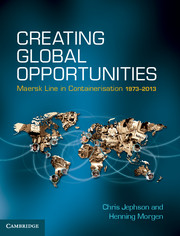Book contents
- Frontmatter
- Dedication
- Contents
- List of figures
- List of tables
- List of Economist Intelligence Unit data
- List of boxes
- Acknowledgements
- Glossary
- Prologue
- 1 ‘Per Aspera Ad Astra’
- 2 The Coming Revolution
- 3 The Decision
- 4 Building the Base (1978–1984)
- 5 Planning the Next Steps (1984–1987)
- 6 Laying the Foundations for Expansion (1987–1990)
- 7 The 1990s
- 8 The Acquisition Trail (1992–1998)
- 9 1999 A Year of Developments and Acquisitions
- 10 Into the New Millennium (2000–2005)
- 11 P&O NedLloyd (2005–2007)
- 12 A New Strategy (2008–2013)
- Epilogue
- Notes and References
- Index
2 - The Coming Revolution
Published online by Cambridge University Press: 05 April 2014
- Frontmatter
- Dedication
- Contents
- List of figures
- List of tables
- List of Economist Intelligence Unit data
- List of boxes
- Acknowledgements
- Glossary
- Prologue
- 1 ‘Per Aspera Ad Astra’
- 2 The Coming Revolution
- 3 The Decision
- 4 Building the Base (1978–1984)
- 5 Planning the Next Steps (1984–1987)
- 6 Laying the Foundations for Expansion (1987–1990)
- 7 The 1990s
- 8 The Acquisition Trail (1992–1998)
- 9 1999 A Year of Developments and Acquisitions
- 10 Into the New Millennium (2000–2005)
- 11 P&O NedLloyd (2005–2007)
- 12 A New Strategy (2008–2013)
- Epilogue
- Notes and References
- Index
Summary
When you look at the inventions or innovation of the last 100 years, there are lots of products, most of them in physical form, such as smart phones. But this really low-tech invention of the container has done more for global trade than anything else.
Søren Skou, CEO, Maersk Line 20121966: a critical year
In 1966 Mærsk Mc-Kinney Møller and the Maersk Line management embarked on the journey towards containerisation. Maersk Line had been in the deep-sea liner business for nearly 40 years and was well established in the Pacific, considered one of the larger trades together with the other east–west trades of the Atlantic Ocean and Europe–Asia, as well as several regional trades, primarily in Southeast Asia. However, their competitors had already made the crucial decision to introduce new services, transporting standardised containers. Maersk Line decided in favour of an alternative to the standard container, and it would take nearly a decade for the company to launch its first fully containerised service. On the troublesome way, Mærsk Mc-Kinney Møller and the Maersk organisation would mature and grow into a modern and even more internationally oriented business.
In the mid 1960s, the world was changing rapidly: the global population had increased by one-third in less than two decades and now numbered around 3.3 billion. Trades in Maersk Line’s main markets in North America and Asia increased dramatically in the same period. The United States’ international trade rose from $19.4 billion to $50.3 billion and Japan’s from $1.7 billion to $15.8 billion. Only a limited number of people in and around the shipping industry had the vision to see the opportunities offered by the standard container for facilitating and expanding this trade. The industry would go through significant changes, and indeed itself become a major driver for changing the world as commodities were moved from break-bulk into containers.
- Type
- Chapter
- Information
- Creating Global OpportunitiesMaersk Line in Containerisation 1973–2013, pp. 27 - 49Publisher: Cambridge University PressPrint publication year: 2014



